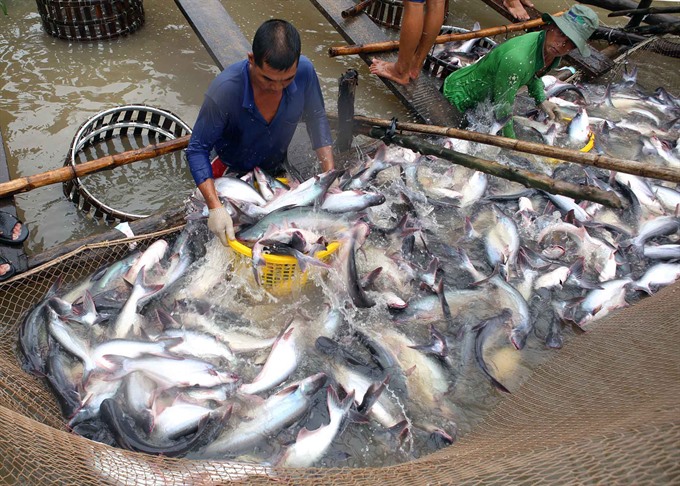 Politics & Law
Politics & Law

A draft amendment to the 2003 Law on Fisheries would allow provincial people’s committees to assign, lease and withdraw sea surface from organisations and individuals for aquaculture farming but a National Assembly working body says the Government or ministries should do the job.
 |
| Members of Tân Thạnh Co-operative in Vĩnh Long Province harvest tra fish. -- VNA/VNS Photo Vũ Sinh |
HÀ NỘI – A draft amendment to the 2003 Law on Fisheries would allow provincial people’s committees to assign, lease and withdraw sea surface areas from organisations and individuals for aquaculture farming but a National Assembly working body says the Government or ministries should do the job.
Presenting an assessment report on the draft revised Law on Fisheries at the ongoing third session of the 14th National Assembly (NA) in Hà Nội yesterday, Chairman of the National Assembly Committee on Science, Technology and Environment, Phan Xuân Dũng, urged reconsideration of the article, saying that giving provincial people’s committees this power would be impractical for large-scale projects which impact several provinces.
On the other hand, Dũng said that for offshore farming, according to Decree 51/2014/NĐ-CP regulating the allocation of sea areas to organisations and individuals exploiting and using marine resources, provincial people’s committees should only be competent to assign or lease sea areas within three nautical miles from the shore.
“In addition, due to the nature of this model, which is carried out far from shore, it is difficult to control national security and defence. This requires integrated assessment of specialised agencies from the Central government,” he said, adding that assignment and lease powers should be held by the Government or a ministry-level unit.
Dũng noted that the examination of the draft revised law by the Committee on Science, Technology and Environment (CSTE) showed that attracting foreign investment into Việt Nam was a step in the right direction. However, allowing foreign individuals and organisations to rent sea areas for aquaculture farming could pose national security issues, he said.
Defence and security issues should be balanced with ensuring economic development, he stressed.
He requested the drafting board devise more detailed regulations on Vietnamese organisations and individuals transferring or subleasing sea area to foreign organisations and individuals to avoid threats to national security.
Prior to Dũng’s report, NA deputies listened to the presentation on the draft amendments by Minister of Agriculture and Rural Development Nguyễn Xuân Cường.
The draft revised Law on Fisheries has basically retained the chapters of the 2003 Law on Fisheries, but has two less. Cường said that parts of the 2003 Law on Fisheries had been inadequate for the fast development of Việt Nam’s fisheries sector.
One noteworthy new point of the draft law is the provision of a quota-based fishing licence.
"This is a change in licensing methods compared to the 2003 law, which is in line with management practices of countries around the world and will control resources more closely," said Cường, adding that the regulation aimed to manage aquatic resources while controlling the building of fishing vessels by fishing collectives.
“This is an effective tool that most countries are now adopting to manage fisheries resources,” he said.
The report from the CSTE noted that fishing activities must comply with fishing regulations. Therefore, the drafting board should carefully study the content to legalise these regulations to suit the reality of the Vietnamese fishing industry and the strict requirements of the European market.
The report also said that the renewal of fishing licences and unified exploitation of fisheries must be managed by quotas to protect fisheries resources.
More forest protection urged
In the afternoon, the agriculture minister presented the draft amendment to the 2004 Law on Forest Protection and Development.
Cường said that over the past 12 years, the 2004 Law on Forest Protection and Development had provided an important legal framework for regulating social relations in protection and development.
Forest area increased from 12.3 million hectares in 2004 to 14 million hectares in 2015, coverage increased from 37 per cent to 40.84 per cent. Annual wood production of planted forest is about 17 million cubic metres, and export turnover of forest products is US$7.1 billion.
However, the law had limitations in preventing deforestation, Cường said, adding that natural forest had declined, encroachment of forest land had become complicated while forestry production had low efficiency, resulting in a low contribution from the forestry sector to the economy and low incomes for people working in the industry.
“As a result, amendments to the law are necessary,” Cường said.
The draft law suggested changing the law’s name to the Law on Forestry but a report from the CSTE said the name should remain.
After the third session of the 14th National Assembly, the CSTE will work with the drafting committee and agencies to finalise the draft law to submit to the National Assembly for consideration.
Mentioning the forest fire in Hà Nội’s Sóc Sơn District that happened the night before, Deputy Chairman of the National Assembly Đỗ Bá Tỵ stressed that “The fire demonstrates that we need to pay more attention to the protection and development of forests.”
Also yesterday afternoon, the NA discussed the draft Law on the Guard Force. -- VNS